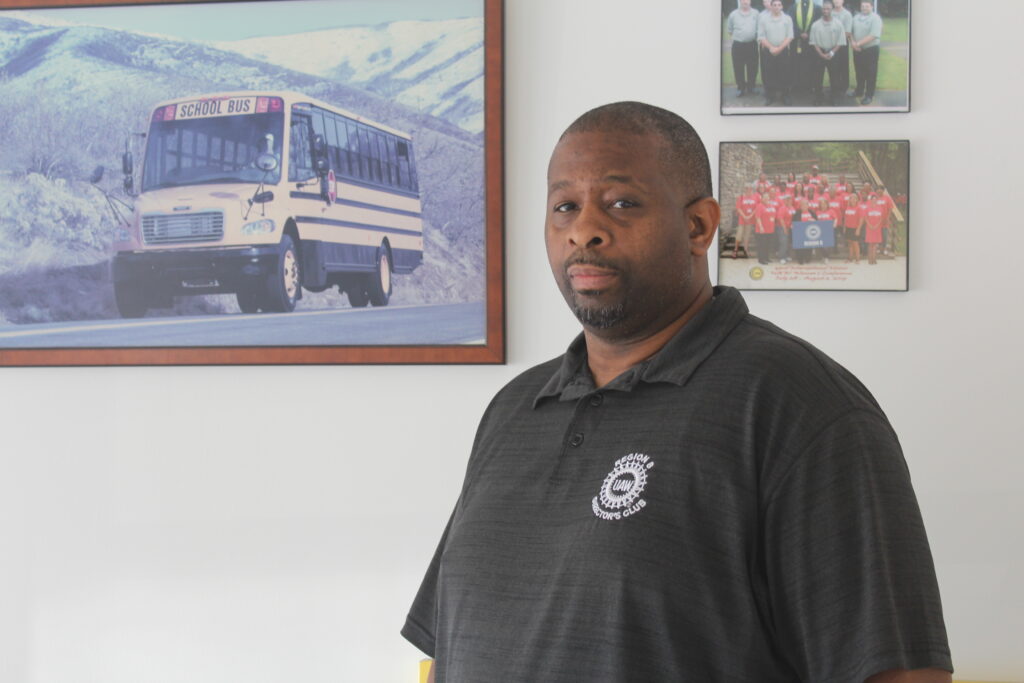Willie Walker, Quality Team Leader at Thomas Built Buses in North Carolina, shares his experience as a long-time union worker in both Detroit and High Point, and his thoughts on the transition to electric school buses
Growing up in Detroit, Willie Walker’s life revolved around auto manufacturing. His father and uncle worked at a factory that supplied Ford, Chrysler, and General Motors and were members of the United Auto Workers (UAW). He too got a job at the factory and became a union member at age 19, building a great life for himself and his family in Detroit. Life took a turn when his wife was offered a job as a school principal in High Point, North Carolina.

“I have no family in North Carolina. My whole family is in Detroit,” Willie adds, “But you have to grow up sometimes.”
When Willie arrived in High Point in 2009, he got a temp job at a manufacturing plant. For the first time, he witnessed and experienced the uncertainty and peril that comes with non-union work.
“They called everyone to this big meeting and started passing out layoff slips. I had only been there for three weeks. There was a guy there who’d been with the company for ten years. Coming from a union background, I thought I’d be the one getting kicked out the house. But no, they gave him the pink slip! They let him go and kept me. That really shook me up,” he recalls.
Willie became a UAW member once again when he got a job at the Thomas Built factory in High Point in 2013. “I didn’t know much about Thomas until one of my church members told me about it. I put in an application there,” he shares. There, he and hundreds of union workers assemble school buses that are distributed to school districts nationwide. “This was a natural fit, coming from auto manufacturing in Detroit,” says Willie. He is currently a quality team leader, inspecting school buses to make sure there are no defects in the paint, structure, electrical, welds, and more.
Willie’s coworkers often don’t understand what being in a union means, especially when they first start. As a leader both in the workplace and in the union, Willie shows new employees the ropes.
“I tell them that we’re one of the few companies that still has a pension and a 401(k). I never have to guess or hope that I’ll get a raise. I know I’ll get a raise. I have job security–I’m entitled to work 40 hours a week. I have a voice if there’s a safety concern. There’s no favoritism. You are respected from the time you come in. That’s the one thing in the community that we’re known for,” he shares with pride. But he also makes it clear that this isn’t just handed to them, “This company will not give you this stuff without having a great union bargaining team.”
While the company currently mostly builds diesel school buses, they are making the switch to electric. Thomas Built is one of three major school bus manufacturers, along with IC Bus in Oklahoma, where workers are also represented by the UAW, and Blue Bird in Georgia, which is non-union. All three companies are now making electric buses. JMA’s recent report on electric school buses argues that unions like the UAW have a critical role to play in ensuring a fair and successful transition to ESBs and other EVs.
Electrification is creating more jobs at Thomas Built. “Our orders have picked up because of the switch to EV [electric vehicles],” Willie explains. “We have a new group of employees who just work on electric units. That created a new classification that we bargained for. It’s starting small, but as time goes on, it will grow.”
He is excited about the transition, “I’d love to see all our school bus models go electric.”
Willie contrasts the continuing success of Thomas Built with the fate of the formerly dominant furniture business in High Point, once known as the “Furniture Capital of the World”: “The furniture market was big here in High Point. A lot of them were non-union.”
At the industry’s peak after World War II, sixty percent of all furniture made in the U.S. was produced within a 150-mile radius of High Point. Then the government decimated employment in the furniture business through a strategy of large-scale prison labor. Incarcerated people are paid as little as pennies a day to build furniture.
Today, if you arrive by train and step out of the Amtrak station in High Point, you find yourself on a street boxed in by the darkened windows of closed furniture shops–now just distribution points that create few jobs.
Yet Thomas Built, which has been in High Point since 1916, is still going strong. Willie argues that if the furniture companies had been unionized, workers would have had the power to keep their jobs from being outsourced. “At Thomas Built, we have a union contract that states you can’t just up and leave and forget the workers. That’s one of the things that’s great about being in a union,” Willie proudly explains.
Though he misses Detroit and beams about its nightlife, (“It’s second to none,” he proclaims), he has built a good life for himself, his wife, and their four children in High Point. “I love it here. It’s a lot slower. Very laid back. It fits our life perfectly.”
